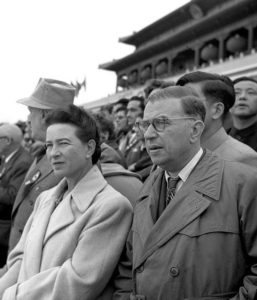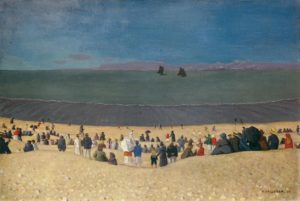الأملُ ليس تفاؤلًا | ديفيد فيلدمان – بنيامين كورن
ترجمة: محمد كزوّ - تحرير ومراجعة: بلقيس الأنصاري حتَّى عندما تعلَم أنّ الآفاق قاتمة، فالأمل يستطيع مساعدتك؛ إنَّه ليس مجرَّد...
Simone de Beauvoir: The Freedom Within
We have thoughts, feelings, hopes and desires. We also can be treated as statistics, objects or obstacles.
The tension between these facts about us is at the heart of Simone De Beauvoir’s lifelong philosophical project. This tension was described by Beauvoir as “ambiguity”.
Beauvoir was an Existentialist, believing that there is no natural, essential or true self — nobody has a pre-defined purpose set out for them. Human beings instead create their own identities and values through the actions that they undertake.
In other words, there is no essence to what you are, waiting to be discovered. What you are is what you do and what is done to you. As Beauvoir put it, “a man is something else besides what he is at this moment.”
In Existentialist terms, human beings are a mix of “facticity” and “transcendence.”
Facticity is what is basically true of us at any given moment — a collection of facts that describe us. When and where we were born, our eye colour, that we can drive a car, the languages we speak, our job and the names of our parents are all examples of the facts that make up this facticity. Both our own actions and the incidental things that happen to us add to our facticity.
Facticity can also limit our freedom — your age or height, for example, could preclude you from certain activities. You are unlikely to ever be a professional basketball player if you are five feet tall.
But as every moment passes, facticity is what we were. Facticity is never what we will be. While we can’t become a professional basketball player, we can decide to take up basketball and that decision changes what we are.
Transcendence is that potential to change the sum of facts about us. We are free to change those facts from moment to moment. I can decide to take a walk, adopt a child, or dye my hair another colour if I wish. These actions — undertaken by my own choice — would change my facticity.
As long as we are alive, we are each an intersection of facticity and transcendence. We are neither all-transcendence, nor are we all-facticity.
For Beauvoir, facticity is our inert self, our self as a “thing”. Transcendence is the driving force that allows to at least partly shape our own destiny.
These two forces at the heart of our being — yoked together but diverging — make the ambiguity of the human condition. They are, for Beauvoir, the very reason that we are faced with ethical choices.

Caption: Simone de Beauvoir with her lifelong partner, Jean-Paul Sartre, in Beijing in 1955. Photo by Liu Dong’ao. (Public domain. Source: Wikimedia Commons)
Beauvoir’s journey as a philosopher was to build an ethics for Existentialism, an ethics that gravitated around this ambiguity. Her journey began with her first philosophical essay Pyrrhus and Cineas (1944) and culminated in what is regarded as her greatest work, The Second Sex (1949).
Pyrrhus and Cineas was written during the Nazi occupation of Paris. It takes its name from a legendary conversation between the king Pyrrhus and his famously wise advisor. At the time Pyrrhus was one of the most powerful kings in the Greek world and a masterful general. Beauvoir quotes the historian Plutarch:
“Plutarch tells us that one day Pyrrhus was devising projects of conquest. ‘We are going to subjugate Greece first,’ he was saying. ‘And after that?’ said Cineas. ‘We will vanquish Africa.’—‘After Africa?’—‘We will go on to Asia, we will conquer Asia Minor, Arabia.’—‘And after that?’—‘We will go on as far as India.’—‘After India?’—‘Ah!’ said Pyrrhus, ‘I will rest.’—‘Why not rest right away?’ said Cineas.”
Cineas’s insistent questioning is regressive — what’s the use in starting anything if you’d ultimately stop? And if you never stop, then starting seems even more pointless.
In Beauvoir’s use, Pyrrhus and Cineas’s discussion does not concern the ethics of conquest, but the rational grounds for taking on any kind of endeavour or project.
Cineas’s advice is generally taken to be wise, and Pyrrhus is wrong to embark on his projects. It makes no sense for the king to leave his kingdom for conquest.
This vignette provokes the central question of Beauvoir’s essay and her life-long philosophical project. It was a question she turned over in her mind — her diary tells us — on her twentieth birthday. The question is, why do anything at all beyond simply subsisting?
We can rephrase that question in a number of ways — why embark on projects? Why try to shape the world around us? Why concern ourselves with other people?
Every time we ask these questions, we come up against Cineas’s wise viewpoint. It’s a viewpoint that’s convincing but that the same time absurd. Our answer is that we simply must.
Cineas’s advice, as Beauvoir interprets it, to simply remain passive is just not consistent with human desire. So Beauvoir instead sides with unreasonable Pyrrhus. While action is unnecessary in the eyes of reason, the compulsion to act is the existential reality for human beings.
Human beings are caught between the two poles of facticity and transcendence at every given moment of our lives. Transcendence pulls us forward into the future. We are propelled forward by action, but how do we choose and justify what actions we take?
In answering these questions, Beauvoir reframes facticity and transcendence to think more broadly about indifference and action.
If we were pure facticity we would be just a thing, an object. Nothing would concern a thing, the inert existence of things is simply “separation and solitude”.
Despite the fact that we cannot — as conscious beings — become pure facticity, Beauvoir identifies a tendency to try to deny the driving force of transcendence within us.
The nameless hero of Albert Camus’ 1942 novel The Stranger epitomizes this tendency. Camus’ character recognises that he has no pre-ordained purpose in the world, and can therefore act with indifference towards it.
People seem to embrace this tendency in times of grief or crisis. The philosopher mentions those “petit bourgeois” who remained indifferent to the Nazi occupation of France, claiming “We still eat the same steak.”
“If I am no longer anything but a body”, Beauvoir writes, “then I am released from all worries, fears, as well as regrets. Nothing moves me, nothing matters to me.”
And this, according to Beauvoir, is the logic of Cineas. It’s to say, why bother? And it really is up to us. Only we can create a connection that unites us to the world, there is no connection that exists before us that ties us to commitment to anything at all.

Caption: Existentialism emerged between wars which ravaged France. The bloody conflicts of the first half of the twentieth century made freedom and violence central themes of Beauvoir’s early philosophical writings. Painting: Felix Vallotton, Le Bois de la Gruerie et le ravin des Meurissons, 1917. (Public domain. Source: Wikimedia Commons.)
We can choose indifference, to try to exist only as a body, released of worries, fears and regrets. But if we turn in on ourselves, we also turn away from enjoyment.
Human beings, Beauvoir argues, simply cannot remain at rest. Satisfaction dissipates quickly, and we find new projects that we wish to fulfil. We are not merely a thing — even if we want to be. We are a “project of self toward other.”
Transcendence, our continual self-creation, pivots around other people. All our actions are motivated by how they would appear in the eyes of the other.
That Pyrrhus could even think about leaving for conquest, demonstrates that he had “already left”.
A central aspect of Existentialism is that we are what we are through our relationships with other things. Our transcendence pushes us to forever becoming what we are, into the “constant emptiness of the future”. To be a thing — pure facticity — is to be dead.
We cannot repose in an eternal instant, we cannot stand to be indefinitely at rest. All efforts point to goals, but goals are only given to be surpassed. This is not to say that goals don’t matter, but goals beget goals. We must always be asking — what next?
And so we embark on projects. These can be banal and simple or important and complicated. Every project has an objective and therefore a concern. Your concern could be the welfare of yourself, a parent, your nation, your pet, your people. But how do we choose? How do we find a meaning for our actions?
Some would choose to believe that God wills all their actions. But Beauvoir reminds us that a God that wills every single human action is no God at all. God’s will, conceived in such a way, is “immobile” and one and the same with the world. Such an idea of God can neither justify nor condemn anything at all. This would leave mankind like an “explorer lost in a desert” — no direction is correct nor incorrect if God wills any direction.
Equally, we can place humanity itself as the absolute end of our projects and actions. But Beauvoir doubts the existence of a humanity that has any intrinsic unity. If humanity could be treated as a “totality that seeks to realise itself”, we would have no freedom to make choices for ourselves.
Humanity is a collective noun for all people, there’s no limit and therefore no unity to humanity, which Beauvoir describes as “plenitude”. Humanity is always “full” whether it be twenty people in existence or twenty billion.
Every person is “too much”, a mere addition to the mass of people, not an integral part of a unified mechanism. Remember that Existentialists assert that our place in humanity is not set out in advance — “existence precedes essence”, as Jean-Paul Sartre put it.
If we choose all mankind to care for, our project would extend to infinity and be just as meaningless as reposing in the instant or believing that God wills every action on earth.
We can only find a place in diffuse humanity by making ourselves objects for other people. We make ourselves instruments for some only by becoming an obstacle for others.
We can join a cause for the good of humanity as we define “good”, but will soon find ourselves opposing another cause, another definition of “good”, and therefore opposing the rest of humanity.
While it seems a depressing thought that there is no intrinsic unity or harmony to humanity, it secures the freedom at the root of our individual existence. If we were unified and harmonious, we would not be free to choose our projects.
Whether we pretend to act by the will of God or by knowing what is good for humanity as a whole, we are simply avoiding the anxiety of facing up to our choices. We are sheltering in absolutist and authoritarian justifications for our actions. It is to think that future ends that justify present means, privileging the future at the expense of the present.
The future is empty and uncertain, and our actions have unknown consequences that could defy or even contradict our expectations and intentions.
Alfred Nobel invented dynamite “in the name of science”, but his invention brought unprecedented destruction in the world. If you do not know for sure what will become of your decisions and actions, how could you convince yourself that you are acting in the interests of a future humanity?

Caption: As much as human beings like to rest, we cannot repose in an “eternal instant”, according to Beauvoir. Painting: Felix Vallotton, La plage à Honfleur, 1919. (Public domain. Source: Wikimedia Commons.)
What principles, then, can guide our actions? For Beauvoir, our lives attain meaning through the recognition of others. If left alone in the world, Beauvoir believed a man “would be paralyzed by the manifest vision of the vanity of all his goals. He would undoubtedly not be able to stand living.”
But the philosopher adds that what we want for others only suits ourselves. Devotion to the good of others can be tyrannical. Devotion is not a passive resignation to the other, but an active project of our own. The welfare of their children, for example, is a goal that parents define. We decide what is good for other people, sometimes regardless of their own idea.
We may express opposition to our children’s choice of spouse, because we believe their choice not to be in their own interest. But they nevertheless chose the spouse, and our disapproval is our choice, not theirs.
“I want you to be happy” leaves the object of our devotion with no choice — we’ll work to make them happy, but only as we define “happy” for them. We believe we are doing right, but there is no “right” way the future set to be.
Instead, Beauvoir suggests that “Lucid generosity” — actions which are truly free and ask only to be recognised as such — should guide our actions, but it would be foolish to think that we can do anything for others.
Beauvoir’s moral thinking revolves around freedom, not any preconceived idea of what is good. We should give “points of departure” that would help others solve their own problems, since there is no immobile happiness we can grant to people. We each have our own projects which when finished beget new projects, in the spirit of lucid generosity, we can assist each other’s endeavours.
But if the poor, the incarcerated and the sick are “free” in their will, as the Existentialists argue, why bother helping them?
The point is that those people who are suffering are free only to themselves. As Beauvoir puts it, “only the impoverished man can declare himself free in the midst of his misery.” In not helping stricken people, we become “the very face” of their misery.
This is the point at which Beauvoir’s deeply ethical thought asserts itself. Her Existentialist theory is largely borrowed — by her own admission — but her ethics is unique.
We are only subjects — free thinking people — to ourselves. We simply cannot think from another’s perspective. If we could, we wouldn’t be who we actually are. It is being trapped in our own situation that allows us to desire and to choose, or rather — forces us to desire and choose. Transcendence, the engine that justifies our existence to ourselves, needs others.
To the other, we are simply part of “all that is not him.” If the other suffers injustice, we are part of that suffering, since we are part of the unjust world in which they suffer.
We are the facticity of any situation for the other, we are part of the facts of the world. Beauvoir quotes Dostoevsky to illustrate this point: “each person is guilty for everything, before everyone.”
When an oppressed people march for equal rights and recognition, they often use the slogan “silence is violence”. Beauvoir would heartily agree with the sentiment behind the slogan. Inaction is action, refusals to choose are choices. It is impossible to escape choice. A good way to sum up Existentialism in this respect is to say that there is no excuse.
Attempting to suppress the freedom of others is denying freedom to ourselves. One way of denying the freedom of others is to dehumanise them.
Beauvoir gives the example of Western women who would undress in front of East Asian male servants with indifference because they were not regarded as men. Of colonialism, she writes, “By rigid taboos, these parasitic societies try their best to defend the masters against the consciousness of the creatures whom they are exploiting.”
But she invites us to imagine if the colonial master’s wish was made true and their slaves actually became animals or robots — truly not-human. The master would be only a thing among things, since our freedom is only freedom in the eyes of the human other. People recognise their freedom only through others.
If we could turn all others into stone, we’d have no purpose. Adversary and alliance is the fuel that transcendence requires.
Our projects must be constructed with others and against others, we create for others so that they may accompany us and surpass our transcendence. Their freedom is important because it conserves our intentions in the actions they undertake. Think of political movements. My ideology is meaningless if not another single soul shares it.
Beauvoir explains that in order to have our freedom recognised by others, we must recognise theirs. Our freedoms support each other “like the stones in an arch.” But it is an arch with no pillars of support — our freedoms exist in a void.

Caption: Being at the service of others’ freedom is a sound ethical objective because others’ freedom adds to our own through alliance and companionship. Painting: Felix Vallotton, The Nurse, 1892. (Public domain. Source: Wikimedia Commons.)
There are those who oppose our projects and violence, in some form, is inevitable. “Our being realizes itself only by choosing to be in danger in the world, in danger before the foreign and divided freedoms that take hold of it.”
Beauvoir’s thoughts on violence show best how deeply a moral thinker she was. “In one sense,” she writes, “violence is not an evil, since one can do nothing either for or against a man.”
That deeper core of transcendence inside us all — the nothingness at the heart of our own existence — cannot be touched. Beauvoir echoes the extraordinary passages of the Stoic philosopher Epictetus, who maintained that no harm could come to our inner self, no matter what violence was rendered on our bodies. Our self is only identical to our choices, not our body.
So it is with Beauvoir that violence can only affect the facticity of our being. “To kill a man is not to destroy him.” But when violence is rendered on another, we harm ourselves by restricting our own freedom.
How? Well, the person we do violence to is not our peer and peers, as already explained, is what we need. The more human power we have on our side, the more we can expand the limits of our possibilities.
So resorting to force is still regarded by Beauvoir as a “failure” — an inevitable failure that’s part of the human condition.
But to renounce all conflict is to renounce transcendence. In some quarrel-free utopia there would be no freedom to choose as we wish, we’d be pure facticity, no different from mere objects.
Social existence itself, Beauvoir insinuates, is violence. It is up to us as individuals to decide “how far” our project extends without being destroyed by violence.
So, to return to Cineas’s question — why bother? We’re compelled to undertake projects for as long as we are consciously alive. To not do is to not be. But how to live authentically and ethically?
We can try to repress the deep-seated freedom inside us — we can try to repose in the eternal instant, we can claim to be acting solely by the will of God or humanity.
In a world where nothing is intrinsically good or bad, Beauvoir’s suggestion is that our own projects are authentically affirmed in the freedom of others.
The more you work to the freedom of others, the more free you become yourself. If the freedom of others is the goal of your actions, your own possibilities expand. But that, of course, requires courage.
ترجمة: محمد كزوّ - تحرير ومراجعة: بلقيس الأنصاري حتَّى عندما تعلَم أنّ الآفاق قاتمة، فالأمل يستطيع مساعدتك؛ إنَّه ليس مجرَّد...
«لقد أثبتت السينما بأنّ لها قُدرة فائقة على التأثير. واليوم من خلال هذا المهرجان؛ نتعاون جميعًا لتعزيز اسم الخليج العربي...
لا عجبَ ألا يملك الأسقف بيركلي وقتًا للحسّ المشترك، فهو الرّجل الذي أنكر وجود المادّة. لقد اشتكى في كتابه «مبادئ...
إن الفلسفة غير معنية بالوضوح أو بتقديم أي إجابات واضحة عن الإنسان والعالم. هناك مقاربات وتيارات فلسفية هي أشبه بلعبة...
«معنى»، مؤسسة ثقافية تقدّمية ودار نشر تهتم بالفلسفة والمعرفة والفنون، عبر مجموعة متنوعة من المواد المقروءة والمسموعة والمرئية. انطلقت في 20 مارس 2019، بهدف إثراء المحتوى العربي، ورفع ذائقة ووعي المتلقّي المحلي والدولي، عبر الإنتاج الأصيل للمنصة والترجمة ونقل المعارف.